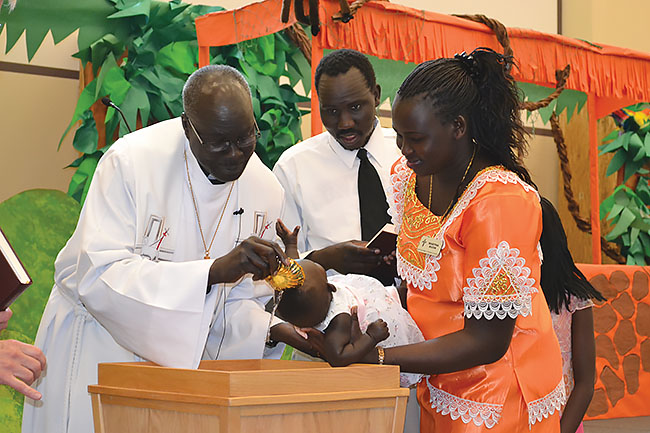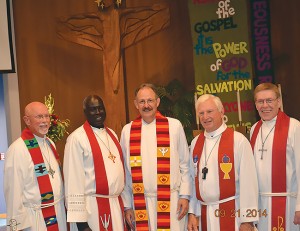
Concordia Seminary Newsroom
From refugee to ‘phenomenal’ ministry leader

In 1993, a 26-year-old South Sudanese Christian arrived in the United States after what he humbly calls “a very difficult time.” Losing two siblings and many relatives and friends to murder and starvation in his war-torn homeland, Matthew Both knew he must flee with his wife, Rebecca, and daughter, Leah, if his family was to survive.
After a trek that included two days without food or water, the trio took shelter in refugee camps in Ethiopia and Kenya — camps where they lived among the “Lost Boys of Sudan,” those children known for their tragic exodus during the long and bloody second Sudanese Civil War.
“I looked like I was completely dying before I come to this country,” said Both, who eventually came to the United States speaking no English
and unsure how to support his family.

Pastor Matthew Both baptizes baby Maya at Bethlehem Lutheran Church in Kennewick, Wash., much to the joy of her parents, Paul Puok and Martha Kuon, April 28, 2013.
Photo: Bethlehem Lutheran Church
Twenty-two years later, Rev. Matthew Both is a 2008 graduate of Concordia Seminary’s Ethnic Immigrant Institute of Theology (EIIT), associate pastor at King of Kings Lutheran Church in Renton, Wash., and “a phenomenal leader in the Christian Sudanese and Lutheran communities,” said
EIIT Director Dr. John Loum.
“He’s the perfect example of how, with some help and guidance, he educated himself as a grown man,” said Loum, who praises Both for “fabulous work bringing Sudanese people to Christ” in the United States and through ongoing mission work in his native country. “He has a missionary’s heart,” Loum said.
Flight from Sudan
A missionary from the United States introduced Both, a member of the Nuer-speaking people, to Christ as a teenager in Sudan, in northeastern Africa.
“I went to school and learned my language in the church in my village and, on July 21, 1985, I was baptized into the family of God and became a believer,” Both said. Before his flight from Sudan, Both vowed that if he did not die first, he would become a pastor.
After three years in refugee camps, his family was among the Sudanese resettled in the United States with the help of Lutheran Immigration and Refugee Service. They relocated in Des Moines, Iowa, where Trinity Lutheran Church was doing outreach to the Sudanese. “My nephew, James Mat Wuor, and Simon Yiech were the first Sudanese to start in this program and they helped it spread around to other Sudanese in different states,” Both said. After a trip to visit members of the “Lost Boys” living in Grand Rapids, Mich., Both moved his family to that area in 2000 and began serving in lay ministry at St. Mark Lutheran Church, Kentwood, Mich.
“I helped Sudanese, Dinka, Anyuak, and Equitorian people become members at the church because I was the only minister in Michigan for these ethnic groups [at that time],” Both said.
While in Michigan, he completed increasingly challenging English as a Second Language course levels and earned a high school diploma. Both also
took a big step toward his dream of pastoral ministry when he enrolled in Concordia Seminary’s EIIT program to strengthen his understanding of Lutheran theology.
“Worker priests” is how Loum describes EIIT students like Both — tackling four years of demanding coursework (both online and residential seminars), “with families, full-time jobs, and doing mission work in their home countries.”
‘Always on the go’
Both is “always on the go,” said Rev. Paul Birner, King of Kings’ senior pastor, “utilizing his gifts among the Anglo people as well as the South Sudanese.” In 2007, King of Kings requested Both’s help starting Nuer-language worship in Renton, another growing center for resettled Sudanese families. A year later, he took a call to serve as the congregation’s associate pastor and was ordained there.

Associate Pastor Rev. Matthew Both, second from left, is part of a legacy of strong leadership at King of Kings Lutheran Church in Renton, Wash. He is pictured here with a group of current and past pastors of the church, Sept. 21, 2014. Photo: King of Kings Lutheran Church
Besides assisting with weekly worship, Both leads two monthly Nuer-language services, teaches Bible classes, makes home and hospital visits, and provides translation services to the local courts.
“Pastor Both does not sit in his office and wait for people to maybe come to him,” Birner said. “He goes to them . . . in our community, several locations in Washington and Alaska, and in South Sudan and Ethiopia.”
For example, on Easter, a few years ago, the South Sudanese did not come to worship at King of Kings as expected. So Both followed the tradition of his homeland, where pastors go out and collect worshipers for Easter. “He went to the apartment complexes where many South Sudanese live, held services there, and collected over 100 to worship,” Birner said.
Both followed that same custom when he was in Ethiopia on Easter this April, helping with construction of a worship facility in Nyinenyang. “About 1,000 members are happy to see a new church built,” he said.
‘An exceptional guy’
Loum says his former student is “one of those people instrumental in planting the Lutheran church in South Sudan and setting up quite a few congregations there.” He also calls Both “unique” among EIIT graduates who typically serve ethnic congregations. “Matthew is associate pastor for King of Kings, a Caucasian congregation, and also serves the Sudanese side by side,” Loum said. “He’s an exceptional guy.”
For his part, Both says he is blessed. “I came to America with one daughter, and now I have six loving daughters and
two boys,” he said of his and Rebecca’s children, who include a niece the couple adopted when her parents died at an Ethiopian refugee camp. “I gained an education and know my language well,” he said. “I received opportunities here in America [that] I would not have been able to receive in my home country.”
Today, Both is training fellow South Sudanese to become missionaries. He’s pointed many South Sudanese toward the Seminary’s EIIT program and is helping his daughter, Nyamal, and another King of Kings member to prepare for enrollment. He also hopes to continue his own pastoral education to better answer his calling — to share Christ, including with his South Sudanese brothers and sisters who “lost so much.”
This former refugee uses Romans to offer encouragement. “We have all struggled,” Both said, “but God loves us. He will never give up on us, and He has a purpose for us because nothing can separate us from His love.”